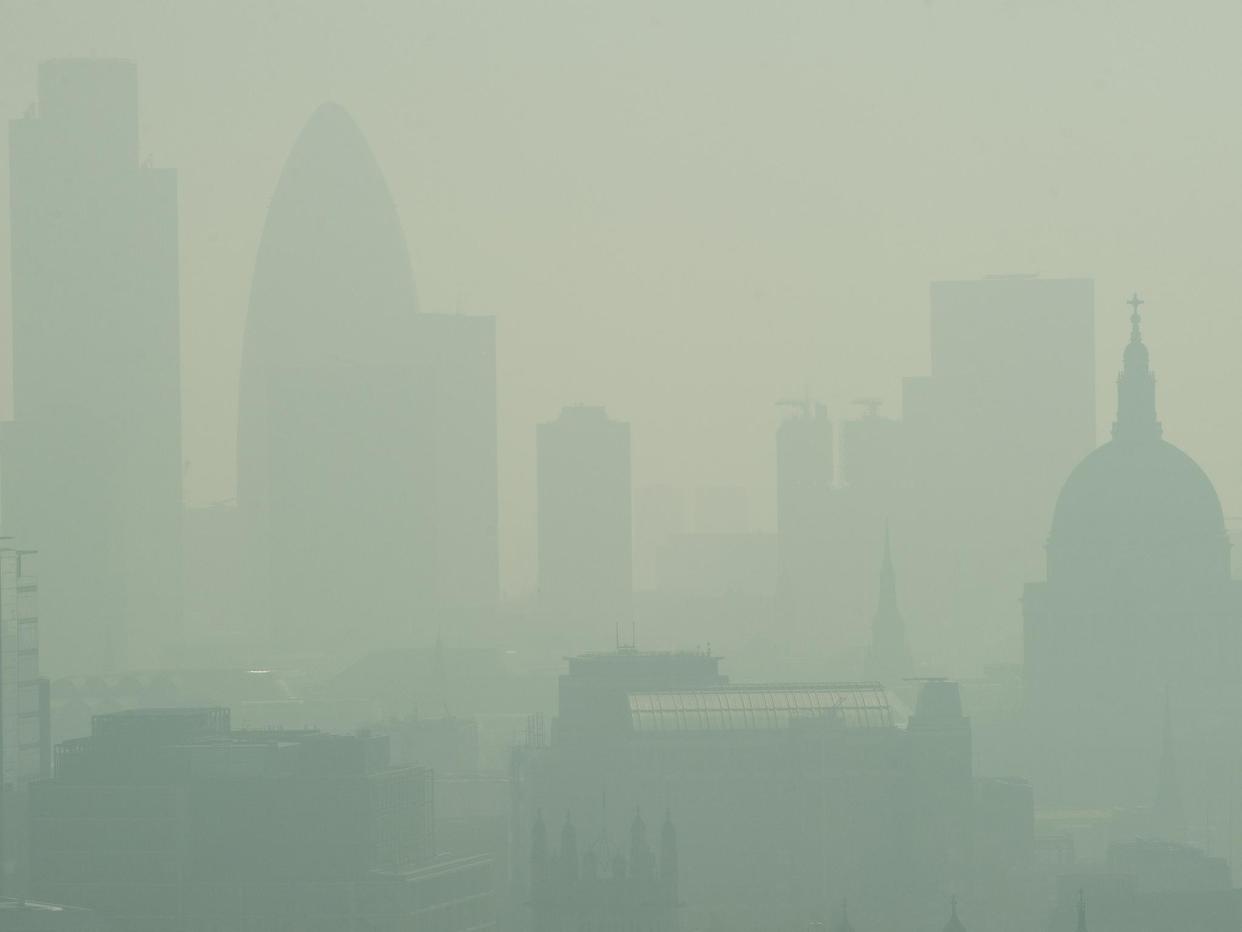Deadly air pollution can get into the bloodstream, 'smoking gun' study suggests

Tiny particles – like those produced in vast amounts by burning fossil fuels – can pass through the lungs into the bloodstream and then damage various different organs, according to a controversial new experiment.
While air pollution has been linked to heart disease and millions of premature deaths, it was previously not known whether it was possible for the smallest particles to pass from the lungs into the bloodstream.
The new research saw 14 healthy volunteers and 12 surgical patients inhale nanoparticles of gold.
Tests on their blood and urine picked up the nanoparticles after just 15 minutes and they were still present up to three months later.
The British Heart Foundation (BHF), which funded the study, said there was “no doubt that air pollution is a killer” but the results of the experiment helped show how the deed was done.
Several scientists praised the research, but one criticised the suggested link to air pollution and said it was "very risky" to give gold nanoparticles to humans.
A paper about the study in the journal ACS Nano by scientists from Edinburgh University and the Netherlands said: “Air pollution is a major public and environmental health issue contributing to up to seven million premature deaths worldwide each year.
“The adverse effects of particulate air pollution on cardiovascular health have been established in a series of major epidemiological studies.”
However finding any tiny particles from air pollution in the human body has proved difficult, so the researchers used gold, which could be more easily detected.
“Healthy volunteers were exposed to nanoparticles by acute inhalation, followed by repeated sampling of blood and urine,” the paper said.
“Gold was detected in the blood and urine within 15 minutes to 24 hours after exposure, and was still present three months after exposure. Levels were greater following inhalation of five-nanometre particles compared to 30nm particles.
“Gold particles could be detected in surgical specimens of carotid artery disease from patients at risk of stroke.”
The discovery of nanoparticles in the bloodstream and their accumulation at inflamed areas within the body “provides a direct mechanism that can explain the link between environmental nanoparticles and cardiovascular disease”, the researchers added.
Professor Jeremy Pearson, BHF’s associate medical director, said the study added to the case for the Government to take steps to reduce air pollution.
“There is no doubt that air pollution is a killer, and this study brings us a step closer to solving the mystery of how air pollution damages our cardiovascular health,” he said.
“More research is needed to pin down the mechanism and consolidate the evidence, but these results emphasise that we must do more to stop people dying needlessly from heart disease caused by air pollution.
“Crucially, individual avoidance of polluted areas is not a solution to the problem. Government must put forward bold measures to make all areas safe and protect the population from harm.”
The Government was twice taken to court over substandard policies designed to reduce air pollution to within European Union safety limits.
And it was twice ordered by a judge to produce a better plan, but failed to meet the latest deadline to do so on 24 April, claiming the imminent general election meant they were no longer able to comply with the judgement.
Andrea Leadsom, the Environment Secretary, dismissed calls to lift 'purdah' restrictions in order to allow new rules to come into force on the grounds that air pollution was not an "unexpected public health emergency".
Professor Frank Kelly, an expert in environmental health at King's College London, praised the “elegant study”, saying it “goes a long way in plugging a gap in the mechanistic understanding of how small particles contribute to vascular injury and disease”.
“If these findings with gold particles reflect the movement of exhaust generated carbon particles, then the increased production of very small particles by modern engine technologies is a cause for further concern,” he said.
And Professor Stephen Holgate, an immunopharmacologist at Southampton University, said: “It is clear from this study that acute episodic exposure to gold nanoparticles has a deleterious effect on cardiovascular disease. As the authors point out, there are also implications for inhaled nanoparticulates from air pollution.
“Beyond acute exposure, what is of great future importance is the effect of chronic exposure to such particles and how early in life these cardiovascular effects begin since air pollution affects human health across the life course."
However Professor Peter Dobson, of Oxford University, said the use of gold nanoparticles to model the effect of air pollution was “inappropriate”.
“The gold does not represent the chemistry that is present in and on airborne particulates from combustion and other anthropological sources,” he said.
He also criticised the use of gold nanoparticles on humans, saying this was “very risky because the small gold particles they used are known to be cytotoxic”.
The mechanism identified in the study, Professor Dobson said, was “of minimal relevance to the real world”.
Environmentalists said the research provided more reasons – beyond global warming – why tackling air pollution was a good idea.
WWF Head of Energy and Climate, Gareth Redmond-King criticised the Government's record on the issue.
"The repeated delays in tackling it puts people’s health – and, indeed, lives – at risk," he said.
"Air pollution is a serious public health crisis and must be an urgent priority for the next Government.
"From the remaining coal in in our power stations to the diesel and petrol in our car, bus, van and train engines, we need to ensure dirty fossil fuels are consigned to the dustbin of history.
"The UK Government’s air quality and clean growth plans must be ambitious in addressing this, replacing petrol and diesel with clean electric vehicles, better public transport, and safer space for cycling and walking.”

 Yahoo News
Yahoo News 
